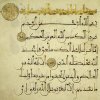(5 minutes)
Moses once heard a shepherd praying as follows: "O God, show me
where thou art, that I may become Thy servant. I will clean Thy shoes and comb
Thy hair, and sew Thy clothes, and fetch Thee milk." When Moses heard him
praying in this senseless manner, he rebuked him, saying, "O foolish one, though
your father was a Muslim, you have become an infidel. God is a Spirit, and needs
not such gross ministrations as, in your ignorance, you suppose." The shepherd
was abashed at his rebuke, and tore his clothes and fled away into the desert.
 Then a voice from heaven was heard, saying, "O Moses, wherefore
have you driven away my servant? Your office is to reconcile my people with me,
not to drive them away from me. I have given to each race different usages and
forms of praising and adoring me. I have no need of their praises, being exalted
above all such needs. I regard not the words that are spoken, but the heart that
offers them. I do not require fine words, but a burning heart. Men's ways of
showing devotion to me are various, but so long as the devotions are genuine,
they are accepted."
Then a voice from heaven was heard, saying, "O Moses, wherefore
have you driven away my servant? Your office is to reconcile my people with me,
not to drive them away from me. I have given to each race different usages and
forms of praising and adoring me. I have no need of their praises, being exalted
above all such needs. I regard not the words that are spoken, but the heart that
offers them. I do not require fine words, but a burning heart. Men's ways of
showing devotion to me are various, but so long as the devotions are genuine,
they are accepted."
In the men of Hind the usages of Hind are praiseworthy,
In
the men of Sind those of Sind.
I am not purified by their praises,
'Tis
they who become pure and shining thereby.
I regard not the outside and the
words,
I regard the inside and the state of heart.
I look at the heart if
it be humble,
Though the words may be the reverse of humble.
Because the
heart is substance, and words accidents,
Accidents are only a means,
substance is the final cause.
How long wilt thou dwell on words and
superficialities?
A burning heart is what I want; consort with
burning!
Kindle in thy heart the flame of love,
And burn up utterly
thoughts and fine expressions.
O Moses! the lovers of fair rites are one
class,
They whose hearts and souls burn with love are another.
Lovers must
burn every moment,
As tax and tithe are levied on a ruined village.
If
they speak amiss, call them not sinners;
If a martyr be stained with blood,
wash it not away.
Blood is better than water for martyrs,
This fault is
better than a thousand correct forms.
No need to turn to the Ka'ba when one
is in it,
And divers have no need of shoes.
you can read literal
version of Moses and the shepherd here,
and a poetic version by Coleman
Barks
 A
kind man, seeing a serpent overcoming a bear, went to the bear's assistance, and
delivered him from the serpent. The bear was so sensible of the kindness the man
had done him that he followed him about wherever he went, and became his
faithful slave, guarding him from everything that might annoy him. One day the
man was lying asleep, and the bear, according to his custom, was sitting by him
and driving off the flies. The flies became so persistent in their annoyances
that the bear lost patience, and seizing the largest stone he could find, dashed
it at them in order to crush them utterly; but unfortunately the flies escaped,
and the stone lighted upon the sleeper's face and crushed it. The moral is, "Do
not make friends with fools."
A
kind man, seeing a serpent overcoming a bear, went to the bear's assistance, and
delivered him from the serpent. The bear was so sensible of the kindness the man
had done him that he followed him about wherever he went, and became his
faithful slave, guarding him from everything that might annoy him. One day the
man was lying asleep, and the bear, according to his custom, was sitting by him
and driving off the flies. The flies became so persistent in their annoyances
that the bear lost patience, and seizing the largest stone he could find, dashed
it at them in order to crush them utterly; but unfortunately the flies escaped,
and the stone lighted upon the sleeper's face and crushed it. The moral is, "Do
not make friends with fools."
you can read a poetic version by Coleman Barks
Before you go on to the next section, make sure you can answer the following questions:
Source: Unless otherwise noted, the readings come from Rumi's Masnavi, translated by E. H. Whinfield (online in pdf format at Omphaloskepsis). This version of the text is provided for your printing convenience. Reading comprehension questions have been added after each section.
|
Modern Languages / Anthropology 3043: Folklore &
Myth. |
|